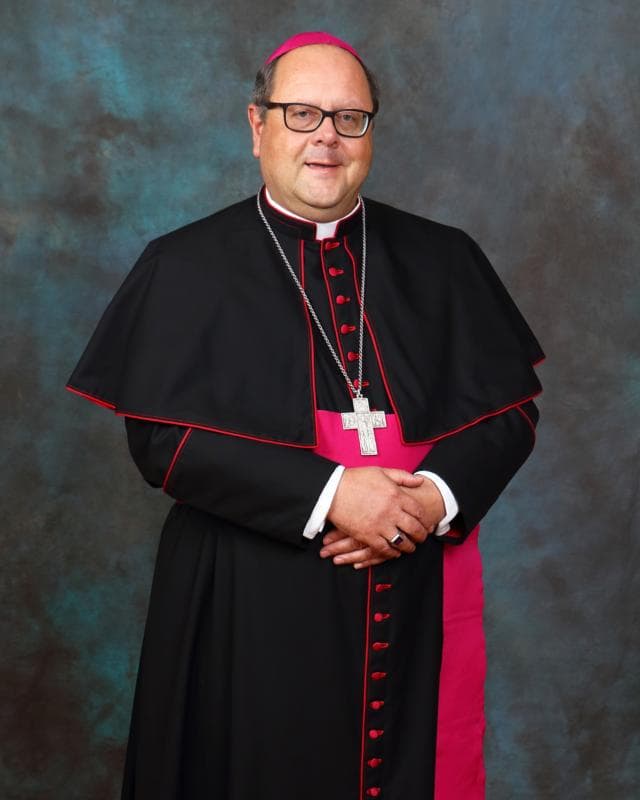CLEVELAND — Bishop Edward C. Malesic, the newly appointed bishop of Cleveland, said his main desire as he makes the transition from heading the Diocese of Greensburg, Pennsylvania, to shepherding his new diocese is to communicate the joy of the Gospel to people.
How to do that, he said, will be determined with the diocesan staff and the people of the Cleveland Diocese.
“I’m looking forward to walking with you as your new bishop and being part of our local church together,” he said during a news conference at Cleveland diocesan offices as he was introduced July 16. “Every change in my life has come with new blessings and I cannot wait to see what blessings await me in this diocese, my new home,” Malesic said.
“Jesus has showed me great love,” he added. “He is the source of my joy. I want to share that joy with everyone. I want to share that joy with you.”
Demonstrating a sense of humor, Malesic, 59, opened his remarks by saying, “You get to see my face,” as he removed the protective mask he wore because of the coronavirus pandemic.
Malesic said his task is to build on the foundation of the strong faith of parishioners and the work of his predecessor in Ohio’s largest diocese, Archbishop Nelson J. Perez of Philadelphia.
One of his first acts after learning of his appointment in early July was to call Perez. “He said, ‘Ed, I have two words for you: Lucky you,'” Malesic recalled.
The appointment came as a surprise, Malesic said, much as was his appointment in 2015 by Pope Francis to be the bishop of Greensburg.
“I had only ever wanted to be a parish priest,” the native of Harrisburg, Pennsylvania, said. “I hope I’m still just a simple priest at heart. I love being a priest.”
It was in Greensburg that parishioners helped him “learn how to be a bishop,” he explained, saying he became close with the Catholic community of the diocese covering four counties of southwestern Pennsylvania about three hours from Cleveland.
“This will not be an easy transition for me. Your prayers will make the change easier,” he said, addressing the people of the Greensburg Diocese.
The bishop acknowledged the Cleveland Diocese, like all others, faces challenges economically and socially from the pandemic, racial tensions and political divisions. He pledged to address the challenges head-on. But he also admitted the task would be a bit daunting because he is coming from a diocese one-fifth the size of Cleveland, which has nearly 700,000 Catholics.
“So be patient with me. I promise to do my best. I know I will make mistakes. Forgive me when I do,” he said.
“We cannot ignore these challenges,” he continued. “But as Christians we trust God provides for us. Christ is now praying that we might all be one. Jesus leads us forward to a future full of hope.”
Among the challenges he has confronted in Greensburg, he said, is the opioid addiction crisis. In 2017 he wrote “A Pastoral Letter on the Drug Abuse Crisis: From Death and Despair to Life and Hope.” He then convened a task force that held listening sessions which attracted about 1,000 people across the diocese, allowing people to learn about the signs of addiction and why opioids hold such a powerful attraction. “And then we prayed,” he said.
The church can be a powerful force to address other societal ills, the bishop explained, because it has the power to convene people and offer moments of prayer that provide comfort.
In response to a question about falling church attendance, fed in part by the clergy sexual abuse scandal as well as misperceptions of church corruption and mean-spiritedness, Malesic called on the church to continue restoring its credibility.
When confronted by people who say they have left the church because they believe the church has left them, BMalesic said he attempts to “communicate what the church is, what the Gospel is.”
“I think the church has become much more transparent today. The church doesn’t tolerate people who would abuse a child in any position within the church. Priests who do abuse children should be treated like everyone else, and maybe treated a little differently, a little more harshly because they’re leaders in the church,” he said.
A onetime biology major in college before entering the seminary, Malesic offered his view on the necessity of wear a facial mask at church when people say they trust God to protect them. He said he places his trust not just in God, but also science.
“Wearing a mask, as I understand it, is really an act of charity toward our neighbor. Yes, God will save me. But wearing a mask (is important) so I can save someone else.”












